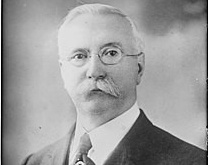An Aberdeen academic will share the story of a Scot who influenced one of the world's most famous peace treaties - exactly 100 years after it was signed.
Neil McLennan, a lecturer from the University of Aberdeen, has been invited to a prestigious conference at the Palace of Versailles by the United States Centennial Commission.
There he will share the story of a little-known farmer’s son from Aberdeenshire, whose expertise on the labour market helped to shape the workers’ rights enshrined in the Treaty of Versailles to reflect the belief that universal and lasting peace can be accomplished only if it is based on social justice.
Under Part XIII of the Treaty of Versailles, the International Labor Organisation was created on June 28 as a branch of the League of Nations in order to address all conceivable aspects of labour rights.
One of those who influenced its creation was Portlethen man James Duncan, born at Hillside Portlethen on in May 5, 1857. Apprenticed as a granite cutter and faced with a slump in the north-east economy, he sought work opportunity further afield and in 1880 emigrated to the US.
Settling in New York, he joined the Granite Cutters National Union and was soon elected their Local Secretary and became its President in 1885 after moving to Baltimore Maryland.
While in office Duncan proposed and won passage of numerous amendments to the union’s constitution forming it into one of the most effective in the country and as a result he was asked to join a delegation formed by President Woodrow Wilson to Russia in the wake of the Revolution. His achievements there led to his inclusion in the Paris Peace talks.
Mr McLennan, a senior lecturer in the School of Education at the University of Aberdeen said: “When the President was preparing for the trip he quickly realised that communist Russia would not be very responsive to a delegation made up entirely of business and military men and that he needed labour delegates.
“Duncan must have acquitted himself well as two years later he was invited to the talks in Paris. These were high level discussions bringing together delegates from countries following the largest conflict the world had ever seen and ultimately resulted in the signing of the Treaty of Versailles.”
Mr McLennan said he was delighted to be able to bring greater awareness of the role played by Duncan in establishing the International Labour Organisation a century on from its creation.
“It is a real honour to be invited by US colleagues to be a delegate at this important and historic conference,” he added.
“A century ago James Duncan from Scotland was invited by President Wilson to play a part in peace discussions. To be in the Versailles Palace famous Hall of Mirrors where President Wilson and James Duncan stood with Prime Minister David Lloyd George and French Premier George Clemenceau will be quite remarkable.
“Today we still need to consider similar issues they were faced with. Philanthropy, cooperation, leadership and peace-making will all be discussed in our sessions one hundred years on. "
Mr McLennan said this was particularly important as while Duncan’s role is one to be celebrated in terms of securing rights such as the eight-hour working day which are still in place today, this was not applied universally.
“For a man so committed to workers’ rights, Duncan’s own position on African American workers being part of unions would not sit well today. The fact that these principles he fought so hard to establish were not applied equitably even in the US after the Paris Peace Treaty can be used to explore important issues around equality, democracy and international relations in this key period of the 20th century and to reflect upon how this has changed and its lasting legacy.
"Duncan is an important figure in our story of societal change and, now that commemorations for the centenary of the end of the First World War have finished, it is vital that we give the same level of consideration to the subsequent ‘peace’, particularly on this important anniversary.”


